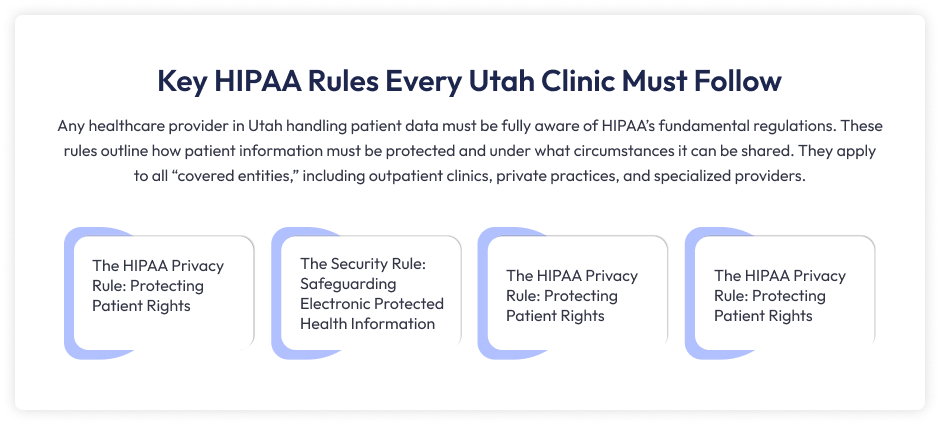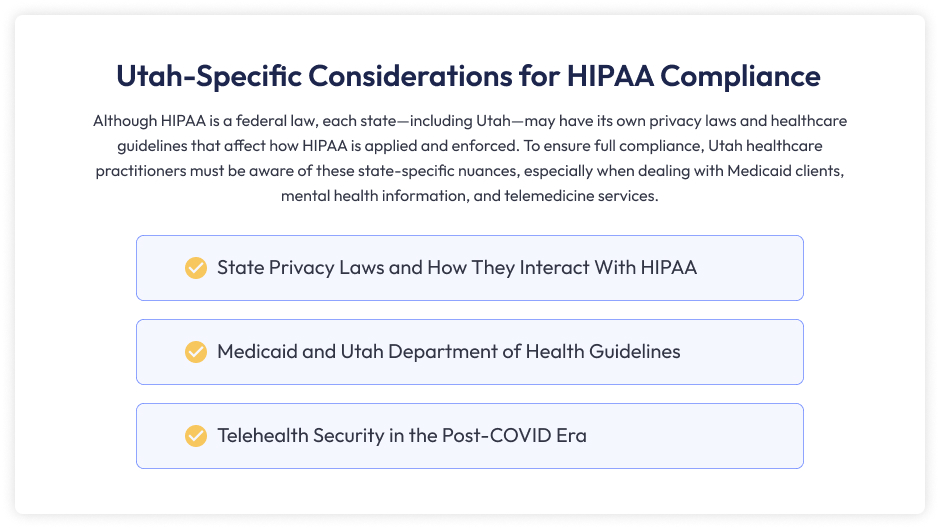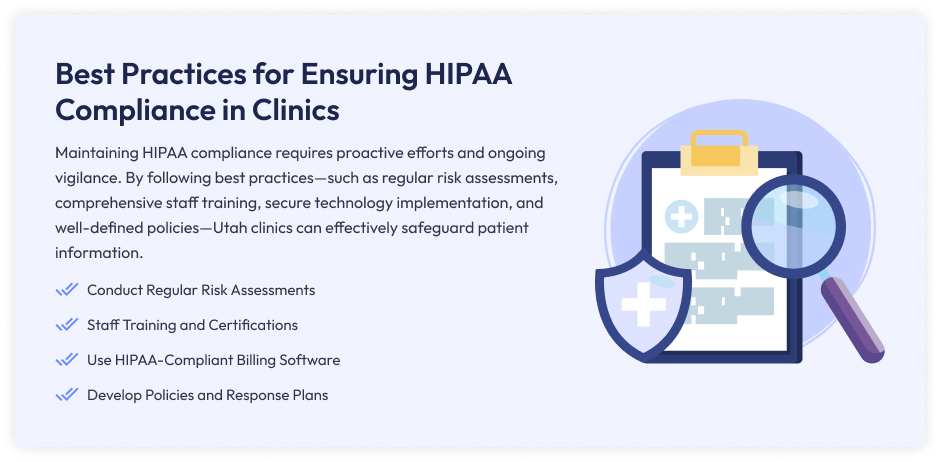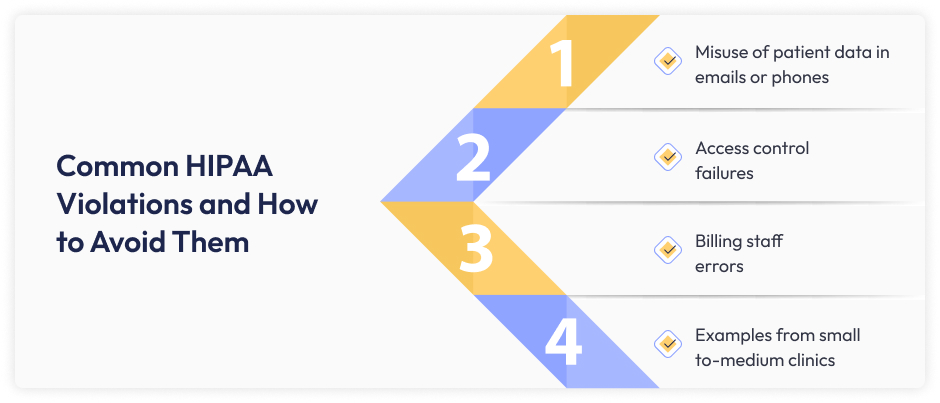HIPAA Compliance Guide for Utah Clinics and Healthcare Providers in 2025
July 15, 2025

HIPAA compliance is not just a legal necessity—it is the foundation of patient trust, operational security, and financial protection for healthcare providers across Utah. Whether you are managing a private mental health clinic in Logan or a general practice in Salt Lake City, understanding federal and state-specific HIPAA obligations is essential. This guide explains how Utah clinics can maintain compliance, secure electronic health records (ePHI), and reduce risks while improving patient care.
For local clinics, staying HIPAA compliant is not just a legal obligation; it’s also essential for maintaining patient trust, protecting electronic health records, and avoiding significant financial penalties. Understanding how HIPAA applies within Utah’s healthcare landscape can help small practices establish a strong compliance foundation and avoid common regulatory violations.
HIPAA requirements continue to evolve in 2025. The growing reliance on telehealth, EHRs, and third-party vendors has made it crucial for Utah healthcare providers to take a proactive, system-wide approach to compliance. The Utah Department of Health and Human Services (DHHS), alongside federal agencies like the OCR, is actively enforcing updated privacy and security requirements—especially among outpatient clinics and practices using cloud-based systems.
Utah Billing services’s, HIPAA-compliant billing infrastructure helps ensure that every transaction, from eligibility verification to final claim submission, aligns with 2025 standards for data protection and risk mitigation.
Utah’s healthcare landscape is unique—large hospital systems coexist with small to mid-sized private practices. In smaller cases, there is frequently less infrastructure to support compliance.
In tight-knit communities like St. George or Logan, even unintentional disclosures of protected health information can spread quickly—potentially harming a clinic’s reputation and eroding patient trust. These smaller communities often rely heavily on personal connections, making privacy lapses particularly damaging.
The growing adoption of telehealth across Utah has also increased the complexity of protecting electronic protected health information (ePHI). As more clinics provide virtual care, ensuring secure data transmission, encrypted platforms, and proper remote access controls becomes essential.
Additionally, Utah clinics may face increased audits and enforcement. The Utah Department of Health and Human Services (DHHS) has the authority to conduct state-level reviews, and clinics are still subject to federal HIPAA audits by the Office for Civil Rights (OCR). Failing to meet state or federal standards can result in significant consequences.
For example:
A small orthopedic clinic in Provo was flagged during a routine software update for operating an outdated electronic health record (EHR) system that lacked two-factor authentication. An internal review uncovered deeper compliance issues, including unencrypted email communications with patients—highlighting how one oversight can expose broader vulnerabilities.
Small and mid-sized clinics often face HIPAA compliance challenges due to limited staffing, outdated systems, or a lack of internal oversight. In Utah practices, some of the most common violations include the
Even when these violations are unintentional, they can lead to serious consequences such as patient complaints, federal investigations, and substantial fines or penalties. Proactive awareness and simple policy updates can help prevent these costly mistakes.

The Privacy Rule sets clear guidelines on how protected health information (PHI) can be used and disclosed, empowering patients with greater control over their medical records.
What Utah clinics need to know:
Utah has additional laws that apply specifically to areas such as mental health, substance use, and reproductive health. When state and federal regulations differ, healthcare providers must follow the rule that offers the greatest protection to patients.
The Security Rule focuses specifically on protecting electronic protected health information (ePHI), while the Privacy Rule covers all forms of PHI. To ensure the security of patient data, clinics must implement administrative, technical, and physical safeguards.
For this Utah clinics should:
These requirements apply to all Utah clinics, regardless of size or location. Outsourcing IT services does not remove your legal responsibilities. It is essential to ensure that your vendors have signed Business Associate Agreements (BAAs) and maintain HIPAA compliance at all times.
When patient data is exposed—whether due to hacking, theft, or human error—the Breach Notification Rule requires healthcare providers to follow a strict timeline and process for notifying affected patients, government authorities, and, in some cases, the media.
In the event that an unsecured PHI breach occurs at your clinic, you need to:
Clinics may also be required to notify the Utah Attorney General of breaches involving personal identifying information—such as financial data or Social Security numbers—under the Utah Data Breach Notification Act, even if the information is not classified as PHI under HIPAA.
The Office for Civil Rights (OCR) enforces HIPAA at the federal level, but depending on the nature of the violation, local Utah agencies may also get involved in enforcement.
Prominent law enforcement bodies include:
Even if no harm comes to a patient, HIPAA violations can lead to substantial financial penalties. The severity of the fines depends on the level of negligence involved and whether the violation was promptly addressed.
Medical billing and revenue cycle management (RCM) involve the ongoing handling, sharing, and storage of protected health information (PHI), including patient demographics, diagnosis codes, and insurance details. As a result, both vendors and billing departments are fully governed by HIPAA regulations. Whether your clinic manages billing internally or outsources it, HIPAA compliance must be integrated into every stage of the billing process.
Protected health information (PHI) is included in every insurance claim and must be protected just as carefully as medical test results or patient history. Even if clinical care is flawless, mishandling financial records can lead to significant HIPAA violations.
Key privacy considerations during billing:
If your clinic uses an external billing service, clearinghouse, or RCM software provider, you must have a Business Associate Agreement (BAA) in place. These vendors are considered business associates under HIPAA and are therefore required to follow strict PHI security regulations.
The duties of your clinic:
When transmitting PHI to billing vendors or clearinghouses—especially electronically—it is essential to use secure channels to prevent unauthorized access during transit.
To protect billing data within your system, you must implement the technical safeguards required by the HIPAA Security Rule. These measures help prevent both internal misuse and external threats such as hacking and phishing.
The following should be included in your clinic’s billing systems:

In some areas, Utah law provides stronger privacy protections than federal HIPAA regulations. When state and federal requirements conflict, healthcare providers must follow the more stringent rule to remain compliant.
Utah-specific privacy considerations:
In addition to HIPAA, clinics providing care to Medicaid beneficiaries in Utah must comply with Utah Medicaid privacy and data-sharing policies. The Utah Department of Health and Human Services (DHHS) also issues additional guidelines for handling patient data in specific situations.
Key Medicaid-related HIPAA considerations:
The COVID-19 pandemic and the rapid expansion of telehealth have introduced new compliance challenges, particularly in Utah, where telemedicine has been vital for providing access to care in rural communities.
To stay HIPAA-compliant with telehealth services in Utah:

Regular risk assessments are essential for identifying potential weaknesses in how your clinic manages protected health information (PHI). Conduct comprehensive evaluations at least once a year or after any significant changes to your systems. To demonstrate compliance during audits or investigations, maintain detailed records of your findings and the corrective actions taken.
Your clinic’s first line of defense against HIPAA violations is well-informed staff. All new employees should undergo comprehensive HIPAA training, with annual refresher courses to keep knowledge up to date. Training should cover proper handling of PHI, recognizing security threats like phishing, and protocols for reporting breaches. To further enhance compliance expertise, encourage staff to earn certifications from reputable healthcare compliance organizations.
The technology your clinic uses for revenue cycle management and billing must comply with HIPAA regulations. When selecting billing software, look for features such as a Business Associate Agreement (BAA), audit logging, role-based access controls, and strong encryption. Reliable options include Kareo, AdvancedMD, Athenahealth, DrChrono, and NextGen Healthcare.
Written, clear policies establish standards for managing protected health information (PHI) and outline steps to take in the event of a security incident. Develop comprehensive privacy and security policies tailored to your clinic’s specific operations. Additionally, create a breach response plan that details notification procedures, investigation protocols, and timelines. Regularly review and update these policies to stay current with evolving laws and technological advancements.

Employees may unintentionally share PHI over unsecured phone lines or send sensitive patient information to the wrong email addresses. To prevent these mistakes, use secure communication platforms and encrypted email services, and provide thorough training on proper handling of electronic communications.
Unauthorized access can happen if former employees retain active system logins or if current staff access records beyond their job responsibilities. To prevent this, promptly deactivate accounts when employees leave and enforce strict role-based access controls.
Billing errors—like sending statements to the wrong address or sharing PHI with unauthorized vendors—can lead to serious breaches. Ensure that billing staff receive thorough HIPAA training and always verify contact information carefully. Additionally, work only with vendors who have signed Business Associate Agreements (BAAs) to maintain compliance.
Many smaller clinics face challenges balancing management duties with limited resources, which can increase the risk of common HIPAA violations. To minimize mistakes, it’s essential to implement proactive staff training, establish clear policies, and conduct regular audits.
Many clinics rely on third-party billing services to assist with revenue cycle management, coding, and claim processing. Utah Medical Billing can improve efficiency, it also introduces additional HIPAA compliance responsibilities. Always choose billing partners like Utah billing Services who use secure, compliant technologies and have a strong understanding of HIPAA requirements.
However, seeking outside assistance is essential if your clinic lacks the internal resources or expertise to effectively handle HIPAA compliance, particularly when working with third-party contractors. Contact Utah Medical Billing today to learn how we can help safeguard your practice while optimizing your billing operations.
HIPAA compliance should be integrated into every aspect of your clinic’s operations—it’s not simply a box to check. Everyone has a role to play in protecting patient privacy, from front desk staff and billing departments to medical professionals. Maintaining compliance not only helps you avoid costly penalties and legal issues but also strengthens patient trust and enhances your clinic’s reputation. Regular internal audits, ongoing staff training, and a work culture focused on data security are key to preventing violations. If you outsource billing or other services, ensure your external partners share your compliance standards. It’s a smart move to contact your billing provider now to review their HIPAA safeguards, confirm a Business Associate Agreement is in place, and ensure their systems align with the latest privacy and security requirements. Engaging your entire clinic in HIPAA compliance can lead to long-term stability, protection, and peace of mind.
Do I need a HIPAA officer in a small Utah practice?
Yes. Even in small clinics, HIPAA requires the designation of a Privacy Officer and a Security Officer though these roles can be held by the same person in smaller practices. This person is responsible for developing, implementing, and maintaining privacy and security policies, as well as training staff and responding to potential breaches. You don’t need a full-time hire for this, but you must assign the responsibility clearly and document it.
Is texting patients allowed in Utah under HIPAA?
Texting patients can be HIPAA-compliant, but only if specific safeguards are in place. The texting platform must support encryption, user authentication, and audit logging. Traditional SMS (like regular phone texting) is not secure and should not be used to send PHI. Many Utah clinics now use HIPAA-compliant messaging platforms such as TigerConnect, OhMD, or Klara to communicate safely with patients.
What’s the fine for a HIPAA violation in Utah?
HIPAA fines are federal, not state-specific, but they apply equally in Utah. Penalties range from $100 to $50,000 per violation, depending on severity and whether the issue was due to willful neglect. Maximum annual penalties can reach $1.5 million per type of violation. In addition, the Utah Department of Health and Human Services or Utah Insurance Department may become involved if Medicaid or insurance-related data is compromised.
Can I use Google Workspace for HIPAA tasks?
Yes — Google Workspace (formerly G Suite) can be HIPAA-compliant, but you must configure it properly and sign a Business Associate Agreement (BAA) with Google. Features like Gmail, Google Drive, and Calendar can be used securely if you enable two-factor authentication, control access, and avoid storing PHI in unencrypted formats. Always double-check that your team is using it according to your clinic’s HIPAA policies.